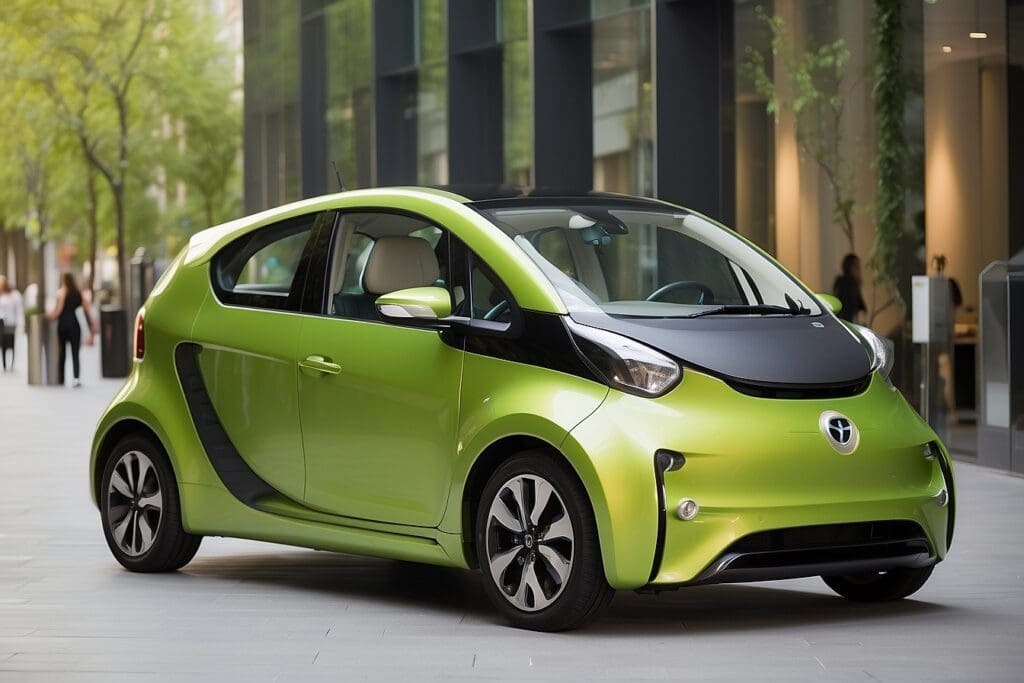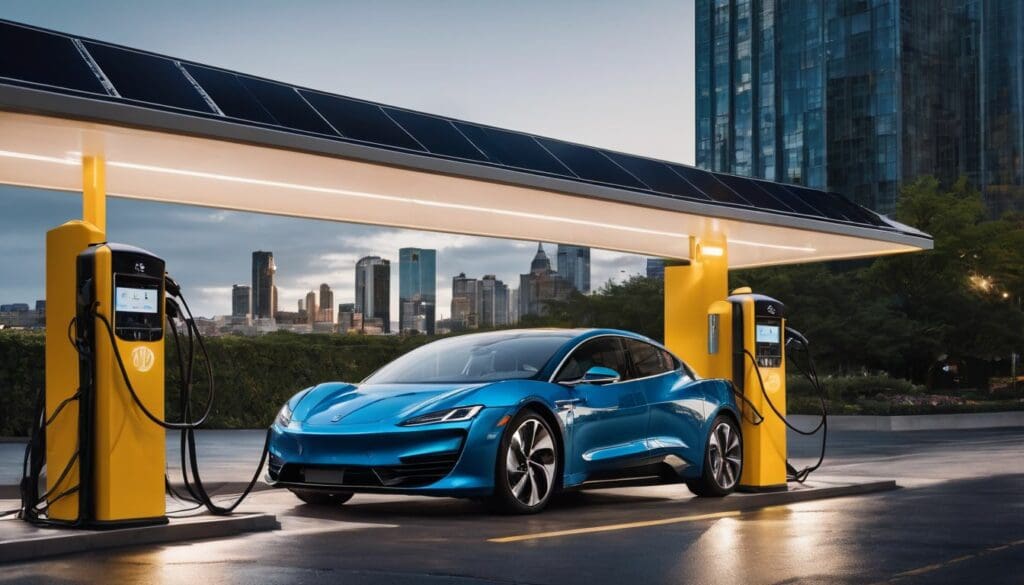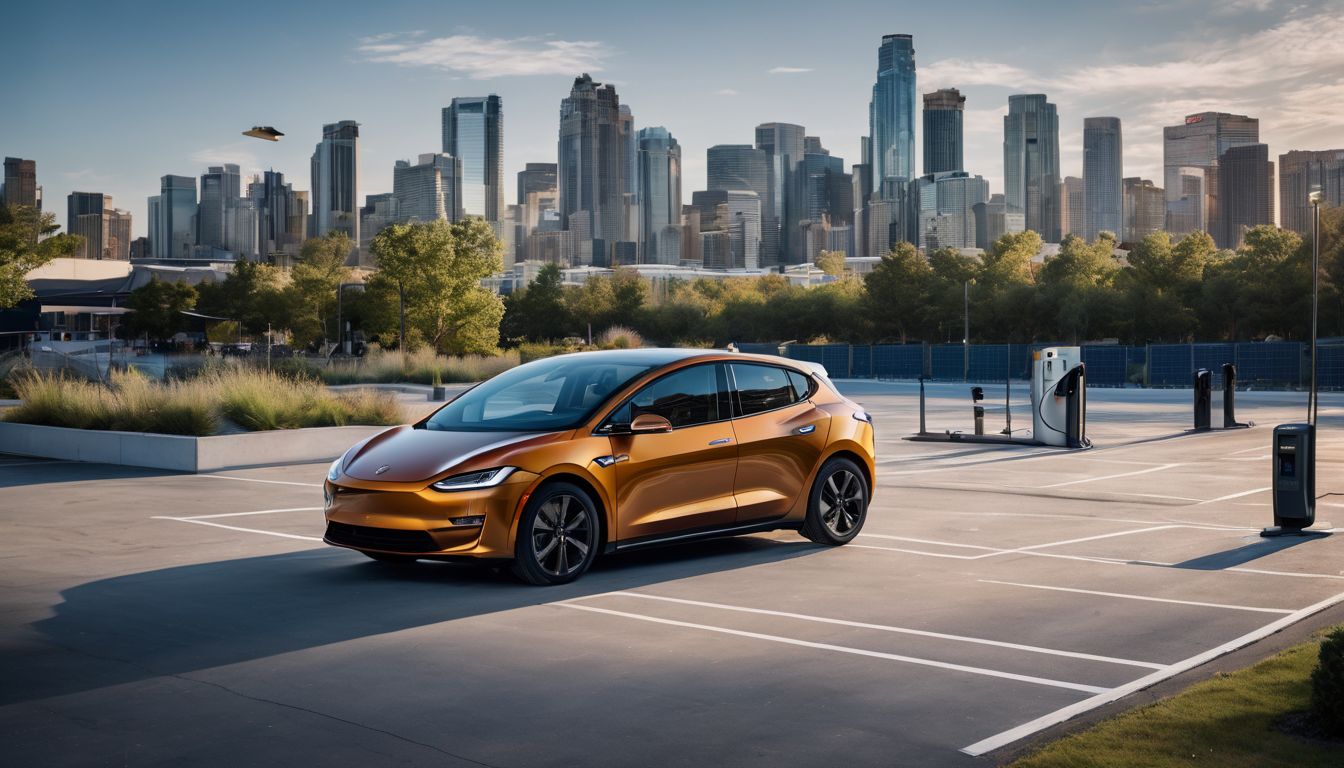As we endeavour to nurture a more verdant Earth, the vehicles we pilot are increasingly coming under the environmental microscope. We’re all mates in this grand journey; personally, I’ve grappled with harmonising my travel desires with a commitment to our planet’s wellbeing and discovered that eco-friendly cars offer a ray of hope.
In this chat, let’s natter about how our united decisions as buyers can give a hefty nudge towards responsible car usage. Prepare to join an exhilarating drive towards sustainable motoring!
Key Takeaways
- Consumer demand for eco – friendly cars is on the rise due to increased environmental awareness and concerns about air pollution and climate change.
- Government incentives, such as tax rebates and investment in EV charging infrastructure, significantly encourage consumers to choose electric vehicles over traditional ones.
- Car manufacturers must adapt their marketing strategies and production processes to meet the growing consumer appetite for sustainable transportation options.
- Environmental labels and transparent information play a vital role in guiding consumers towards making environmentally friendly vehicle choices.
- The car – buying experience is evolving with customer expectations leaning towards brands that demonstrate respect for nature through sustainable practices.
Environmental Concerns in the Transport Sector

The transport sector has a significant impact on the environment, contributing to air and noise pollution, as well as greenhouse gas emissions. These environmental concerns result in social and economic costs that affect the health and well-being of communities.
Impact on the environment
Our daily travels take a heavy toll on our planet. Cars pump out carbon emissions, contributing to the greenhouse effect that heats up the earth. Traditional vehicles use fossil fuels – these are limited resources and their extraction can harm ecosystems.
We all see the impact: polluted air, extreme weather, and wildlife struggling to survive in their changing habitats.
Switching to eco-friendly cars makes a real difference. Electric vehicles (EVs) and hybrid models cut down on harmful emissions drastically. They run cleaner, reducing our carbon footprint and helping slow climate change.
As we embrace renewable energy sources for powering these green vehicles, we move closer to sustainable transportation that preserves our environment for future generations. Driving an EV means we’re part of the solution – steering away from pollution towards cleaner air and healthier communities.
Social and economic costs
Eco-friendly cars can significantly reduce the social and economic costs associated with traditional vehicles. They offer benefits such as lower air pollution, which reduces healthcare expenses related to respiratory illnesses.
Additionally, eco-friendly cars contribute to a reduction in carbon emissions, leading to improved public health and decreased climate change impacts. These environmentally conscious choices also help decrease reliance on fossil fuels, potentially lessening geopolitical tensions and conflicts over oil resources.
Moreover, embracing eco-friendly cars can result in substantial savings for individuals and society as a whole. With reduced fuel consumption and fewer maintenance requirements due to simpler electric car engines, consumers may experience significant financial relief.
The Influence of Consumer Demand on the Rise of Eco-Friendly Cars
The rise of eco-friendly cars is largely influenced by consumer demand, with government incentives and evolving attitudes towards electric vehicles playing a significant role. Consumer motivations for adopting eco-friendly vehicles are driving the shift towards more sustainable transportation options.
Government incentives
Government incentives play a significant role in encouraging the adoption of eco-friendly cars. They include tax credits and rebates for purchasing electric vehicles, reduced registration fees, and access to high-occupancy vehicle lanes. These incentives aim to make eco-friendly cars more attractive and affordable for consumers who are concerned about environmental factors. Additionally, government support can also extend to funding for EV charging infrastructure development, creating a more convenient environment for electric vehicle users. Furthermore, grants for research and development in clean technology also contribute to the advancements in eco-friendly vehicles, making them more accessible and appealing to environmentally conscious individuals.
Consumer attitudes towards electric vehicles
- Environmental consciousness among consumers guides their preference for electric vehicles, prioritising lower emissions and reduced environmental impact.
- Financial incentives, such as tax credits and rebates, motivate consumers to consider electric vehicles as an economically savvy choice.
- Consumer perception of charging infrastructure affects their willingness to embrace electric vehicles, seeking convenient and reliable charging options.
- The convenience and ease of use of electric vehicles influence consumer purchase intention, including factors like range anxiety and charging time.
- Public awareness campaigns and educational efforts are instrumental in influencing consumer attitudes towards embracing electric vehicle technology.
- The perception of social responsibility further encourages individuals to opt for eco – friendly transportation solutions like electric vehicles, aligning with their environmental values.
- Changing consumer preferences towards sustainable living also drive the shift in attitudes towards favouring electric vehicles over traditional combustion engine cars.
Motivations for adopting eco-friendly cars
We choose eco-friendly cars because they help us reduce our environmental impact and support sustainable practices.
- Desire to decrease carbon emissions and air pollution for a healthier environment.
- Saving money on fuel costs over the long term by using electric or hybrid vehicles.
- Reducing dependency on fossil fuels and supporting renewable energy sources.
- Contributing towards a more sustainable future by reducing overall environmental footprint.
- Enjoying the advanced technology and innovative features in eco-friendly cars, providing a modern driving experience.
The Importance of Consumer Awareness and Education

Consumer awareness and education play a crucial role in promoting eco-friendly cars. Environmental labels, marketing strategies, and changing expectations of the car-buying experience all contribute to shaping consumer attitudes towards sustainable transportation options.
Environmental labels
Environmental labels provide crucial information about a product’s environmental impact, helping consumers make informed decisions. With clear and standardised labels, eco-conscious individuals can easily identify the most sustainable options when choosing cars.
This includes key factors such as fuel efficiency, emissions ratings, and overall environmental performance – all of which play a significant role in their decision-making process.
By considering eco-friendly labels when purchasing vehicles, consumers actively drive demand for more sustainable transportation solutions. Awareness and understanding of these labels empower environmentally conscious individuals to align their purchases with their values while encouraging manufacturers to prioritise eco-friendliness in their products.
Marketing strategies
To increase consumer awareness and encourage the adoption of eco-friendly cars, car manufacturers should implement targeted marketing strategies. This can include promoting financial incentives for electric vehicles and emphasising environmental benefits in advertising campaigns.
Creating effective communication through environmentally conscious branding and factual information about the positive impact on the environment can influence consumer perceptions positively.
Car manufacturers must also adapt their marketing strategies to align with changing expectations of the car-buying experience. Implementing educational initiatives within dealerships or via digital platforms, providing clear information about EV charging infrastructure, and highlighting environmental labels on eco-friendly vehicles are crucial steps in catering to the needs of environmentally conscious consumers.
Changing expectations of the car-buying experience
Consumers today expect a more seamless and eco-conscious car-buying experience. Environmental labels, transparent marketing strategies, and incentives play a crucial role in shaping their perception of the car-buying process.
Manufacturers are responding by offering more sustainable options and developing innovative ways to educate consumers about eco-friendly cars.
The shift towards an environmentally conscious car-buying experience is driven by increasing consumer demand for sustainable transportation solutions. As buyers become more aware of the impact of their choices on the environment, they seek brands that align with their values and offer a hassle-free purchasing journey.
How Consumers’ Attitudes Towards the Environment Shape Car Brand Experiences
Consumers’ attitudes towards the environment play a significant role in shaping their experiences with car brands, including their respect for nature and the impact of eco-friendly advances on brand perceptions.
To learn more about how consumer demand is driving the rise of eco-friendly cars, continue reading.
Respect for nature
Car manufacturers are increasingly demonstrating respect for nature by incorporating sustainable materials and eco-friendly production processes. The use of recycled and renewable materials in car interiors and exteriors is becoming more common, reflecting a commitment to reducing the environmental impact of vehicle manufacturing.
In addition, innovations such as eco-friendly fuel options and energy-efficient technologies are further evidence of the automotive industry’s growing awareness of its role in preserving the natural environment.
Moreover, consumers can contribute to respecting nature by choosing car brands that prioritise environmental sustainability. By favouring companies with transparent eco-friendly practices, environmentally conscious individuals signal their support for preserving nature through their consumer choices.
Environmental self-assets
Car manufacturers can build cars with eco-friendly features, but it’s up to us as consumers to make environmentally conscious choices. When we prioritise energy-efficient vehicles and low-emission models, we are contributing to a cleaner and healthier planet.
Our decision to invest in hybrid or electric vehicles directly impacts the demand for sustainable transportation options, driving car manufacturers to keep innovating towards more eco-friendly alternatives.
By choosing eco-conscious cars, we become self-assets in the fight against climate change. Each time we opt for a vehicle with lower environmental impact, we are taking an active role in reducing carbon emissions and safeguarding our natural resources.
The role of eco-friendly advances in car brands
Car manufacturers are embracing eco-friendly advances to meet the rising demand for sustainable vehicles. Advancements such as electric and hybrid technology, sustainable materials, and energy-efficient design play a crucial role in reducing carbon emissions and promoting environmental conservation.
Consumers are increasingly drawn to car brands that prioritise eco-friendly technologies, reflecting a growing societal shift towards sustainability. As more car manufacturers invest in eco-friendly advances, the future of environmentally conscious transportation looks promising.
Next – Implications for the future of eco-friendly cars
Implications for the future of eco-friendly cars.
Consumer attitudes and preferences are increasingly driving the development of eco-friendly cars. The surge in demand for electric vehicles reflects a growing societal consciousness about environmental impact and sustainability.
As this trend continues, it is likely to lead to further innovation in energy-efficient technologies and sustainable materials within the automotive industry. Additionally, consumer influence may prompt car manufacturers to prioritise eco-friendly practices throughout their production processes, potentially leading to a significant reduction in carbon emissions.
Car manufacturers should anticipate a shift towards increased consumer demand for eco-friendly cars and adapt their strategies accordingly. This could involve ramping up investments in clean energy alternatives and enhancing marketing campaigns that highlight the ecological benefits of their products.
Conclusion
In conclusion, consumer demand plays a pivotal role in shaping the eco-friendly car market. Government incentives and changing attitudes towards electric vehicles are driving forces behind this shift.
As consumers become more environmentally aware and educated, their expectation of the car-buying experience evolves. Car brands that embrace eco-friendly advances stand to gain from these changing consumer attitudes.
In essence, the future of eco-friendly cars hinges on how well they align with consumer preferences and values.
FAQs
1. Why is consumer demand important for eco-friendly cars?
Consumer demand drives the market for eco-friendly vehicles, influencing manufacturers to create more electric and hybrid cars that are better for the environment.
2. How do consumer attitudes affect electric vehicle adoption?
The willingness of eco-conscious consumers to buy climate-friendly vehicles like electric cars can boost their popularity and encourage wider adoption.
3. What role do financial incentives play in promoting eco-friendly cars?
Financial incentives make it more affordable for people to purchase eco-friendly cars, which helps increase their appeal and encourages consumers to consider them over traditional vehicles.
4. Can environmental labels influence buyers’ decisions on ecofriendly vehicles?
Yes, environmental labels inform consumers about the green credentials of a car, which can sway their preferences towards choosing more environmentally friendly options such as hybrid or electric vehicles.
5. Are people concerned about EV charging infrastructure when buying electric cars?
Certainly! Consumer perception of how easy it is to use EV charging stations greatly impacts their decision-making process when considering whether or not to buy an electric vehicle.





